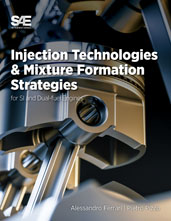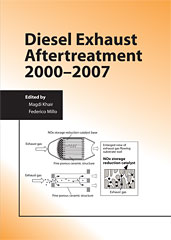Book

Injection Technologies and Mixture Formation Strategies For Spark-Ignition and Dual-Fuel Engines
2022-06-24
Fuel injection systems and performance is fundamental to combustion engine performance in terms of power, noise, efficiency, and exhaust emissions. There is a move toward electric vehicles (EVs) to reduce carbon emissions, but this is unlikely to be a rapid transition, in part due to EV batteries: their size, cost, longevity, and charging capabilities as well as the scarcity of materials to produce them. Until these issues are resolved, refining the spark-ignited engine is necessary to address both sustainability and demand for affordable and reliable mobility. Even under policies oriented to smart sustainable mobility, spark-ignited engines remain strategic, because they can be applied to hybridized EVs or can be fueled with gasoline blended with bioethanol or bio-butanol to drastically reduce particulate matter emissions of direct injection engines in addition to lower CO2 emissions.

